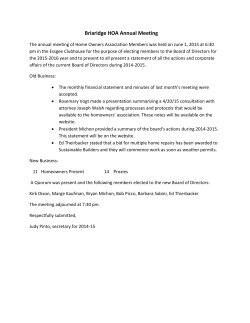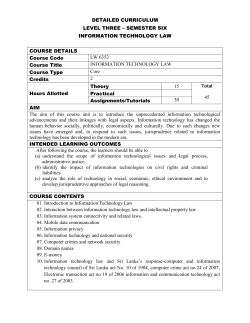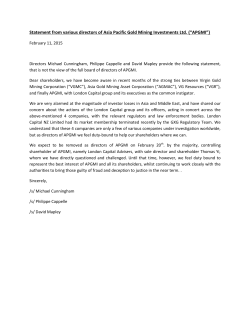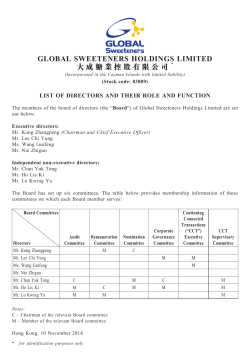
SLID Board Brochure_10394
Be sharper in the Boardroom BOARD LEADERSHIP Director Certification Programme SLID THE SRI LANKA INSTITUTE OF DIRECTORS SRI LANKA INSTITUTE OF DIRECTORS Founded in 2000 under the aegis of the Ceylon Chamber of Commerce, SLID has grown to be an independent, professional organization ,solely dedicated to foster good board governance and practices both in the public and private sectors. Today, SLID Offers a variety of educational programmes focused on developing informed decision making and good practices at board level and thereby adding value to a critically important segment of professionals in the country who can meet the challenging demands of the modern world. Our Vision To contribute to the professional advancement of directors and to foster leadership characteristics which are beneficial to companies, their stakeholders, the community and the nation. Our Mission To be the apex organization, representing the interests of corporate directors in Sri Lanka. BOARD LEADERSHIP Director Certification Programme “The Corporate Governance Framework should ensure the strategic guidance of the company, the effective monitoring of management by the Board, and the board’s accountability to the company and shareholders” OECD Principles of Corporate Governance Become more effective as a director by gaining greater understanding of the entire range of duties and responsibilities that go with the role, whilst enhancing board performance and decision-making. The “Board Leadership” comprehensive development programme, comprises four Parts (sixteen modules) and is the only professional programme available in Sri Lanka that leads to the certification of directors- both SLID member directors and non-member directors. SLID Ordinary Members who complete the programme are eligible to become Graduate Members and are entitled to use the post nominal GSLID. This flagship Board Leadership training programme is compiled using the material developed by the International Finance Corporation (IFC) Global Corporate Governance Forum and is endorsed by the Securities and Exchange Commission of Sri Lanka (SEC) SLID contributing towards good corporate stewardship The need for good corporate governance and boardroom practices have never been so pertinent and important, with increased expectations and responsibilities being placed on directors whilst key stakeholders keenly observe director behaviour and performance as a matter of right. The Sri Lanka Institute of Directors, the trailblazer on board governance, presents its flagship BOARD LEADERSHIP Director Certification programme, which provides timely and relevant director education, carefully crafted to add value to boardroom practices. This programme is compiled using material developed by the International Finance Corporation (IFC) Global Corporate Governance Forum, and is endorsed by the Securities and Exchange Commission(SEC) of Sri Lanka. This director certification programme is delivered by well experienced practicing directors using professionally developed material and adult learning techniques. This learning is a must for all practicing directors and aspiring directors, in both private and public companies and state owned enterprises. Pravir Samarasinghe Chairman Sri Lanka Institute of Directors Message by Chairman, Securities and Exchange Commission of Sri Lanka (SEC) It gives me great pleasure in forwarding this message on the occasion of the Sri Lanka Institute of Directors (SLID) launching its flagship “Board Leadership Director Certification Programme”. A well-developed capital market plays a fundamental role in ensuring efficient allocation of resources and stimulating economic growth in a country. In addition, markets which engender integrity, investor confidence and a level playing field for all market participants are able to attract investors as well as issuers. It is against this backdrop that an effective corporate governance system has become a precondition in creating competitive and efficient companies which can stimulate economic growth. Since corporate governance essentially involves a framework of rules and practices which ensure accountability, fairness, and transparency in a company, the Board of Directors plays a pivotal role in influencing an organisation's governance environment. Therefore, it is imperative that directors undergo periodic training to understand the concepts of corporate governance and any other related developments in order to make their boards more effective. As the capital market regulator, the SEC strives to promote good corporate governance practices, through the maintenance of a fair, transparent and orderly market. Furthermore, we count on the support and partnership of the industry in enhancing corporate governance standards. The SEC is especially delighted to be associated with the efforts of SLID in promoting good governance practices among Board Directors by offering a comprehensive four part programme on “Board Leadership”. I wish to commend the efforts of the SLID for formulating this programme and envisage that it will encourage companies to facilitate capital formation more effectively whilst safeguarding accountability, transparency and confidence. Thilak Karunaratne Chairman Securities and Exchange Commission of Sri Lanka PART 1 CORPORATE GOVERNANCE Part One explores the roles played by and the division of responsibilities among the shareowners, boards, directors, executive managers, and other stakeholders within the corporate governance system. MODULE 1: CORPORATE GOVERNANCE This module provides an overview of corporate governance. On completion, participants will be able to: • Define and explain the key principles and elements of good corporate governance systems • Explain how a corporate governance framework works effectively within a company • Respond to corporate governance concerns and challenges MODULE 2: THE BUSINESS CASE FOR CORPORATE GOVERNANCE This module explains the benefits associated with good corporate governance practices. On completion, participants will be able to: • Describe the policies and procedures of a corporate governance system • Assess their own company’s policies and procedures • Explain the business case for corporate governance • Identify ethical challenges and how these are addressed through a model code of ethics MODULE 3: DISCLOSURE AND TRANSPARENCY This module explains the benefits obtained with corporate disclosure and transparency. On completion, participants will be able to: • Describe the company’s benefits for providing timely, accurate disclosures • Explain company information (financial and non-financial) that should be disclosed • Determine good practices to deal with insider trading and related-party transactions MODULE 4: SHAREOWNERS AND STAKEHOLDERS This module examines the role of shareowners and stakeholders within the corporate governance system and discusses their needs. On completion, participants will be able to: • Identify shareowner rights established by law or mutual agreements • Explain the impact of share concentration; pyramids, and family ownership • Describe how minority shareowner rights are protected • Identify key stakeholders and recognize their importance Course date : 25th & 26th March 2015 Participation Fee : Part 1 Rs. 40,000/- PART 2 THE BOARD Part Two builds on the overview provided in Part One and explores the board’s role in determining a Company’s corporate governance framework. MODULE 1: BOARD’S ROLE, DIRECTORS’ DUTIES AND LIABILITIES This module examines the board’s role and discusses the duties, powers and liabilities of directors. On completion, participants will be able to: • Describe the board’s governance roles and responsibilities • Differentiate managing versus directing and identifying dilemmas • Discuss the role separation of the Chairman and CEO • Analyse directors’ legal duties and liabilities MODULE 2: THE EFFECTIVE BOARD: COMPOSITION AND STRUCTURE This module examines the characteristics of an effective board. On completion, participants will be able to: • Identify the characteristics and benefits of a balanced board • Define types of directors and their leadership attributes • Describe good practices in managing board directors’ roles, responsibilities, committees, and remuneration MODULE 3: BOARD PRACTICES This module identifies best practices associated with the chairman, executive directors, non-executive directors, and the corporate secretary in the following areas: • Meeting preparation • Conducting meetings • Follow-up and in-between meetings MODULE 4: BOARD PROCEDURES This module identifies best practices for board procedures. On completion, participants will be able to: • Identify a dysfunctional board’s characteristics • Articulate key elements of a board evaluation • Develop solutions to improve a board’s effectiveness Course date : 28th & 29th April 2015 Participation Fee : Part 2 Rs. 40,000/- PART 3 STRATEGIC LEADERSHIP Part Three of the program explores one of the most important roles: the role of the board in formulating and implementing strategy and managing enterprise risk. MODULE 1: THE GOVERNANCE OF STRATEGY This module examines the board’s role in governing corporate strategy. On completion, participants will be able to: • Explain an effective strategy’s components • Analyse the board’s role in the governance of a company’s strategy • Identify the benefits of developing a strategy • Use the appropriate tools to formulate strategy MODULE 2: EVALUATING STRATEGY DELIVERY AND EXECUTIVE DIRECTORS' PERFORMANCE This module examines the board’s role in evaluating the delivery of strategy. In addition, it discusses how a board should evaluate executive directors’ performance. On completion, participants will be able to: • Use key performance frameworks and indicators to evaluate organizational performance • Identify and implement appropriate actions based on performance assessment • Use key performance indicators to evaluate CEO’s and other executive directors’ performance MODULE 3: THE GOVERNANCE OF RISK This module examines the board’s role in governing risk. On completion, participants will be able to: • Describe the nature of risk and the board’s role in risk management • Apply risk-assessment and decision-making frameworks • Outline priorities for disaster-recovery and business-continuity planning MODULE 4: CORPORATE RESPONSIBILITY This module examines the role of shareowners and stakeholders and discusses their needs. On completion, participants will be able to: • Define corporate responsibility (CR) and related terms • Describe the business case and best practices for CR • Relate the board’s role in strategy and risk to CR • Develop a CR strategy for a company and apply CR measurement and reporting tools Course date : 26th & 27th May 2015 Participation Fee : Part 3 Rs. 40,000/- PART 4 FINANCIAL STEWARDSHIP AND ACCOUNTABILITY Part Four explores the financial stewardship obligations of the board to the shareowners. Financial stewardship involves the directors being the guardians of the company’s assets and being predisposed to act in the shareowners’ best interests. Accountability involves the responsibility of the director to justify, explain or account for the exercise of the board’s authority, performance, and actions to the shareowners and other appropriate stakeholders. MODULE 1: FINANCIAL OVERSIGHT This module examines the financial oversight role of the board. On completion, participants will be able to: • Describe the board's role in financial stewardship and financial oversight • Discuss the international and local accounting environment • Analyse financial statements and their relation to liquidity, profitability, and performance • Identify the consequences of inadequate financial information MODULE 2: REPORTING This module discusses corporate reporting to share owners and other stakeholders. On completion, participants will be able to: • Understand the reporting environment and identify the key users and their information needs • Analyse the key elements of narrative reporting and explain the methods for communicating with investors and other stakeholders • Define the regulator’s role in enforcing reporting obligations • Explain the importance of effective shareowner communications and investor relations MODULE 3: CORPORATE FINANCE This module discusses the board’s role in corporate finance. On completion, participants will be able to: Identify sources of corporate finance and their relative advantages and disadvantages • Assess the critical issues associated with determining a company’s capital gearing, dividend policy and valuation • Use various capital investment appraisal techniques • Identify financial crisis indicators MODULE 4: THE CONTROL ENVIRONMENT This module examines the company’s control environment. On completion, participants will be able to: • Describe the control environment, board responsibilities, and informal controls • Identify the audit committee’s organization, roles, and duties • Describe the contribution that external audit makes to sound corporate governance • Discuss whistle blowing, current oversight concerns, and regulatory developments Course date : 25th & 26th June 2015 Participation Fee : Part 4 Rs. 40,000/- Target Audience • Directors of listed and private companies and state owned enterprises • Practicing directors (Executive and non Executive) • Aspiring and Potential directors Programme outcomes • Improved effectiveness as a director • Full understanding of directors’ duties and liabilities • Comprehension of the board’s role, practices and procedures • Enhancement of your board’s effectiveness and decision making • Increased performance of your organization, through improved board dynamics • Programme delivery • Delivered by trained trainers • Supported by experienced and practicsing directors • Course content interwoven by an all encompassing case study • Course material developed by the International Finance Corporation (IFC) Global Governance Forum • Customised and updated to suit Sri Lanka • SLID certification • Award of GSLID post nominal to all SLID member participants who graduate on completion of all parts of the programme CLOSING PANEL DISCUSSION WILL BE WITH SENIOR PRACTISING DIRECTORS VENUE: Winchester Ballroom The Kingsbury, Colombo 1. SPECIAL OFFER: REGISTRATION FOR ALL FOUR PARTS RS.140,000/For registrations: Please call 2301646/7 or e-mail iod@sltnet.lk Condition for Certification: Minimum attendance of 90% of programme modules. Use of GSLID Post Nominal: Must be Ordinary Members of SLID THE SRI LANKA INSTITUTE OF DIRECTORS No. 8, Rheinland Place, Colombo 3. (www.slid.lk) SLID THE SRI LANKA INSTITUTE OF DIRECTORS PUBLICATIONS SRI LANKA INSTITUTE OF DIRECTORS BOARD LEADERSHIP Director Certification Programme REGISTRATION FORM Name of Participant Company ---------------------------------------------------------------------------------------------------------------------------------------------- Designation ------------------------------------------------------------------------ Contact Numbers ---------------------------------------- Mobile ----------------------- E mail address ------------------------------------------------------------------------ Postal Address ------------------------------------------------------------------------ Registering for (pls. tick) Part 1---- Part 2---- Part3---- Part 4---- All 4 Parts------Mode of Payment Cheque---- Cheque No: ------------------ Cash--------------- Cheques to be drawn in favour of The Sri Lanka Institute of Directors No. 8, Rheinland Place, Colombo 3 Tel: 2301646/ 7, iod@sltnet.lk PUBLICATIONS
© Copyright 2025









